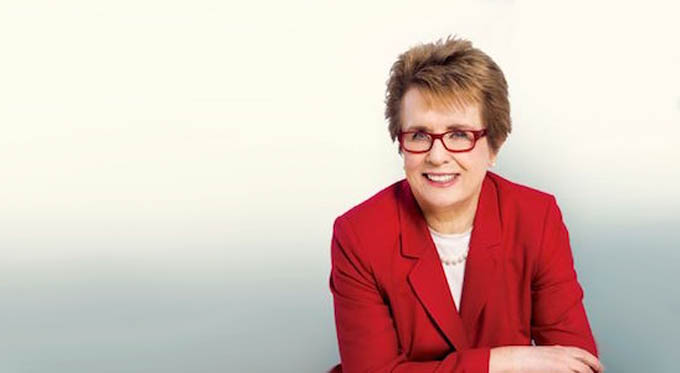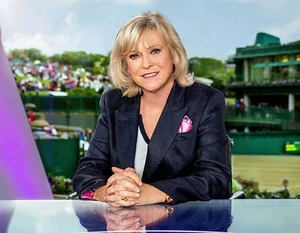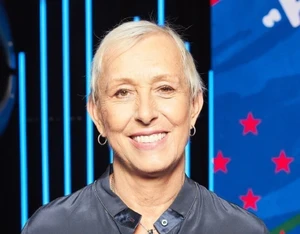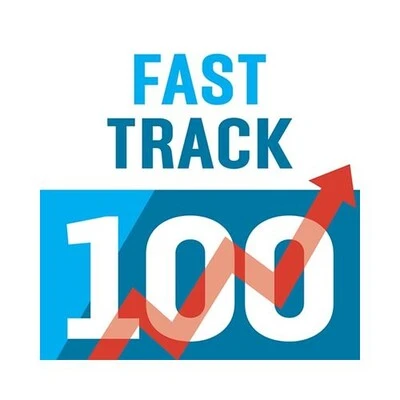
Billie Jean King is a pioneer of female empowerment, and the inspiration behind the 2017 hit biographical film, Battle Of The Sexes. The world-renowned tennis champion was more than a sportswoman, she was the posterchild for modern feminism in an age of masculine chauvinism and belittling, mostly from her famed opponent Bobby Riggs. When Bobby stated that female tennis players were inferior, and that he could, despite being significantly older, beat Billie in a match, she stepped up to the net and proved him wrong. This landmark moment made history for female and LGBT+ athletes alike, providing that our differences can only make us stronger. Since then, Billie has further pioneered inclusion in sport, both through her political initiatives, TED talk and public speeches, as a diversity and female inspiration speaker.
Finding fame from the Battle of the Sexes, as her match with Bobby Riggs was coined, Billie was projected into the limelight. Since she was a young girl, she had been an advocate for gender equality, a motivation that drove her to accept Bobby’s challenge. The self-described chauvinist was a Wimbledon winning player in the 30s and 40s, and despite being 55 at the time of the match, still thought that Billie, who was 29, was an inferior player. The match was viewed by 90 million people, many of whom nervous female fans eager to see Billie prove the male-dominated sport wrong. To this day, it remains one of the most watched sporting events of all time. Billie won the match, and exposed millions of women to a dream they had not let themselves consider before – becoming a tennis champion.
When booked for events, Billie recounts this iconic match to all those in attendance of her presentation, providing them with an insider perspective few have been lucky enough to learn. As the highest-ranking tennis player of 1966, she took home victory after victory at Wimbledon, the US open and the Fed Cup, to name of few of the prestigious competitions that Billie has competed in. Noticing that male and female players weren’t paid the same, she formed the Women’s Tennis Association, founded the World Team Tennis co-ed circuit and started the Women’s Sports Foundation. Later in her career, Billie founded the Billie Jean King Leadership Initiative, to further address the need for diversity in sport.
Later becoming a greatly influential coach, Billie was the first female athlete to be named Sports Illustrated Sportsman of the Year, in 1972, inducted into the International Tennis Hall of Fame in 1987 and the Chicago Gay and Lesbian Hall of Fame in 1999. Billie has even had an award named after her, by the Women’s Sports Foundation. In 2009, President Barack Obama awarded Billie the Presidential Medal of Freedom for her LGBT+ activism, while in 2018 she received the BBC Sports Personality of the Year Lifetime Achievement Award. To name just a few of her awards, a speaker like Billie is sure to open her audience’s eyes to the pioneering work that has earned her such a reputation, leaving guests with a better awareness of the LGBT+ and gender discrimination around them.
When she is booked for events, Billie Jean King is known to discuss the following topics.
1973 Battle of the Sexes – Widely regarded to be one of the most importance sporting moments in modern history, the 1973 Battle of Sexes set feminism on a trajectory to mainstream prominence. Formerly undermined in the sporting world, Billie’s victory proved that female players were just as capable as their male counterparts – if not better.
Inclusion in Sport – Billie’s first experience with gender inequality was at the age of 12, when she wasn’t allowed to wear tennis shorts like the boys did. This was only the beginning, with Billie later being underpaid, undermined, and underappreciated in the sport. Since then, she has used her fame and influence to rewrite the rulebook for future female tennis players, and promote the importance of inclusion not just in sport, but in life too.
Overcoming Adversity – Whether she was faced with homophobia or sexism, Billie used the criticism to fuel her advocacy, and overcome adversity. When booked for events, she uses the experiences that have defined her to inspire audiences, teaching them the techniques she used to push past challenges in life. Whether in the streets or the boardroom, Billie’s invaluable insight arms audiences with a toolbox for overcoming adversity.
Equal Pay, Equal Work – Equal pay has played a large role in Billie’s life, with many of her advocacy campaigns centering around the imbalance in prize money for male and female tennis championships. She used her influence to lobby for equal prize money in the US Open, and even found a sponsor to make it happen. Billie promotes the importance of equal pay at events.
- 2021 - Awarded the Sports Illustrated Muhammad Ali Legacy Award
- 2020 - Became the first woman to have a major sporting event named after them when the Fed Cup was renamed the Billie Jean King Cup
- 2018 - Received the BBC Sports Personality of the Year Life Time Achievement Award
- 2014 - Founded the Billie Jean King Leadership Initiative
- 2009 - Awarded the Presidential Medal of Freedom by Barack Obama
- 2008 - Named Global Mentor for Gender Equality for UNESCO
- 2008 - Published Authored Pressure is a Privilege: Lessons I’ve Learned from Life and the Battle of the Sexes
- 2006 - The USTA National Tennis Centre was renamed the USTA Billie Jean King National Tennis Centre
- 2003 - The International Tennis Federation awarded her the Philippe Chatrier Award
- 1999 - Received the Arthur Ashe Courage Award
- 1987 - Inducted into the International Tennis Hall of Fame
- 1984 - Became the first female commissioner in professional sports history
- 1974 - Started the Women's Sport Foundation
- 1974 - Co-founded the World TeamTennis co-ed circuit
- 1973 - Successfully lobbied for equal pay for men and women at the U.S. Open
- 1973 - Won 'The Battle of the Sexes' against Bobby Riggs, which was watched by over 90 million people
- 1973 - Founded the Women's Tennis Association
- 1972 - Won the U.S Open, Wimbledon and the French Open
- 1972 - Became the first woman to be named Sports Illustrated Sportsman of the Year
- 1971 - Became the first woman to earn over $100,000 in prize money
- 1968 - Won Wimbledon and the Australian Open
- 1967 - Named the Associated Press Female Athlete of the Year
- 1967 - Won the U.S.Open and Wimbledon
- 1966 - Became the number 1 ranked woman in the world
- 1966 - Won her first major singles championship at Wimbledon
- 1961 - Alongside Karen Hantze Susman as they became the youngest pair to win the Wimbledon women's doubles title
- Won 20 Wimbledon titles, 13 U.S. Open titles, four French Open titles and two Australian Open titles
How to hire Billie Jean King
Contact the Champions Speakers Agency to provisionally enquire about hiring Billie Jean King for your next event, today. To get in touch, simply call an official booking agent on 0207 1010 553 or email us at [email protected] for more information.
** We do NOT accept requests for autographs, signed merchandise, fan mail, birthday messages or any other non-commercial contact with the speakers or acts. Each speaker on the website may not have necessarily worked with Champions in the past but are known to perform such engagements within the industry.







